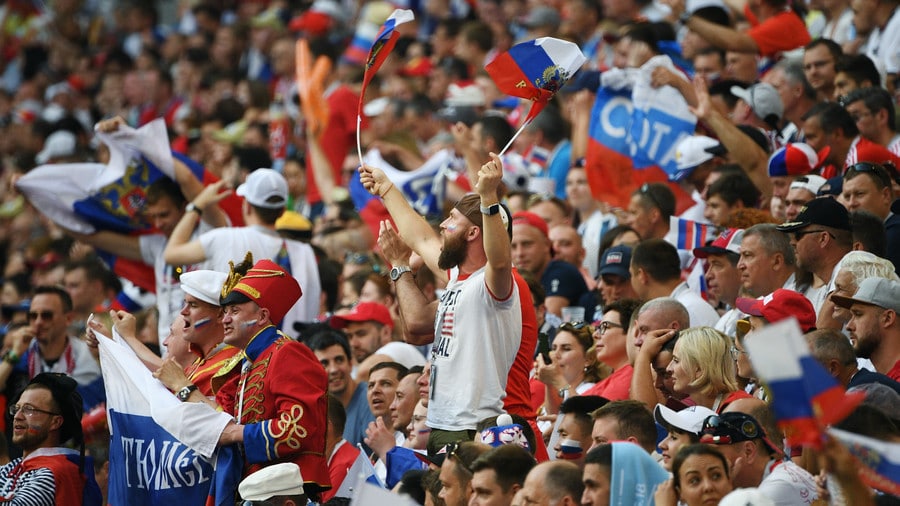“Whether the feel-good factor will have any longer lasting impact, either domestically or internationally, remains doubtful”
Dr David White of the University of Birmingham writes for The Conversation:
That was a great World Cup, wasn’t it? It had memorable matches played in magnificent stadia, great goals and plenty of shocks. In Russia, the success of the much-derided national team was an unexpected treat for the host nation.
The tournament kicked off amid fears of hooliganism and talk of a new Cold War. Many wondered whether Russia, politically antagonistic and still mired in an athletics doping scandal, was even a fit country to host the competition.
Within a matter of days, however, the doom mongering was long forgotten. In the UK, pundits and sports journalists spoke with undisguised surprise about just how welcoming the Russians were and how well the tournament was organised. Rather than the much-anticipated images of hooligans clashing in the streets and of security forces ruthlessly tackling any over-exuberance, we saw fans from different nations happily mingling with their Russian hosts and posing for selfies with the previously feared militia.
For those of us with an interest in Russia (and I have studied the country and its politics for 20 years) this didn’t come as a huge surprise. Anyone who has spent time there will tell you that Russians are, on the whole, very hospitable people, particularly away from the tourist traps of Moscow and St Petersburg. In cities such as Kaliningrad, Samara and Nizhny Novgorod, the Russian people have gleefully welcomed the influx of supporters. The inhabitants of Saransk (a city the size of Sunderland) will long remember the day when 40,000 Peruvians descended on their city for their opening clash with Denmark.
So the world has seen Russia at its best: warm, friendly and welcoming. But how much has really changed?
Very little, according to the small but vocal Russian political opposition. For them, normal service would be resumed once the tournament was over.
The irony of Iranian women happily attending their team’s matches in Russia and protesting against the ban on women attending games in their own country was not lost on Russian dissenters. Their de facto leader, Alexei Navalny, had only just been released from prison after spending 30 days in custody for holding an unsanctioned protest.
Opposition activists, however, decided that actions that could portray the country in a bad light would be counterproductive during the razzmatazz of the cup. The four members of the performance group Pussy Riot who ran onto the pitch during the final were the exception not the norm.
Instead, most well-known oppositionists took time out to enjoy the football. Ilya Yashin, a thorn in the side of the Kremlin and a close associate of the assassinated opposition leader Boris Nemtsov, tweeted a selfie from Russia’s opening game at the Luzhniki stadium with the accompanying text: “Hate my government, love my country.”
So the world has seen Russia at its best: warm, friendly and welcoming. But how much has really changed?
Very little, according to the small but vocal Russian political opposition. For them, normal service would be resumed once the tournament was over.
The irony of Iranian women happily attending their team’s matches in Russia and protesting against the ban on women attending games in their own country was not lost on Russian dissenters. Their de facto leader, Alexei Navalny, had only just been released from prison after spending 30 days in custody for holding an unsanctioned protest.
Opposition activists, however, decided that actions that could portray the country in a bad light would be counterproductive during the razzmatazz of the cup. The four members of the performance group Pussy Riot who ran onto the pitch during the final were the exception not the norm.
Instead, most well-known oppositionists took time out to enjoy the football. Ilya Yashin, a thorn in the side of the Kremlin and a close associate of the assassinated opposition leader Boris Nemtsov, tweeted a selfie from Russia’s opening game at the Luzhniki stadium with the accompanying text: “Hate my government, love my country.”
Well-staged major sporting events have, of course, always been used by hosting nations as PR exercises and Russia was been no exception. Such events also present golden opportunities for burying bad news. On the eve of the competition, the prime minister, Dmitry Medvedev, announced a rise in the retirement age from 60 to 65 for men and 55 to 63 for women. Protests were organised for July 1, which happened to coincide with Russia’s shock victory over the 2010 winners, Spain. Thoughts of having to work an extra five or eight years were lost amid the celebrations.
The 2018 World Cup has undoubtedly been a PR success for the Putin regime at a time when Russia has suffered a great deal of reputational damage. However, whether the feel-good factor will have any longer lasting impact, either domestically or internationally, remains doubtful. One thing is for sure, Qatar 2022 has a hard act to follow.

